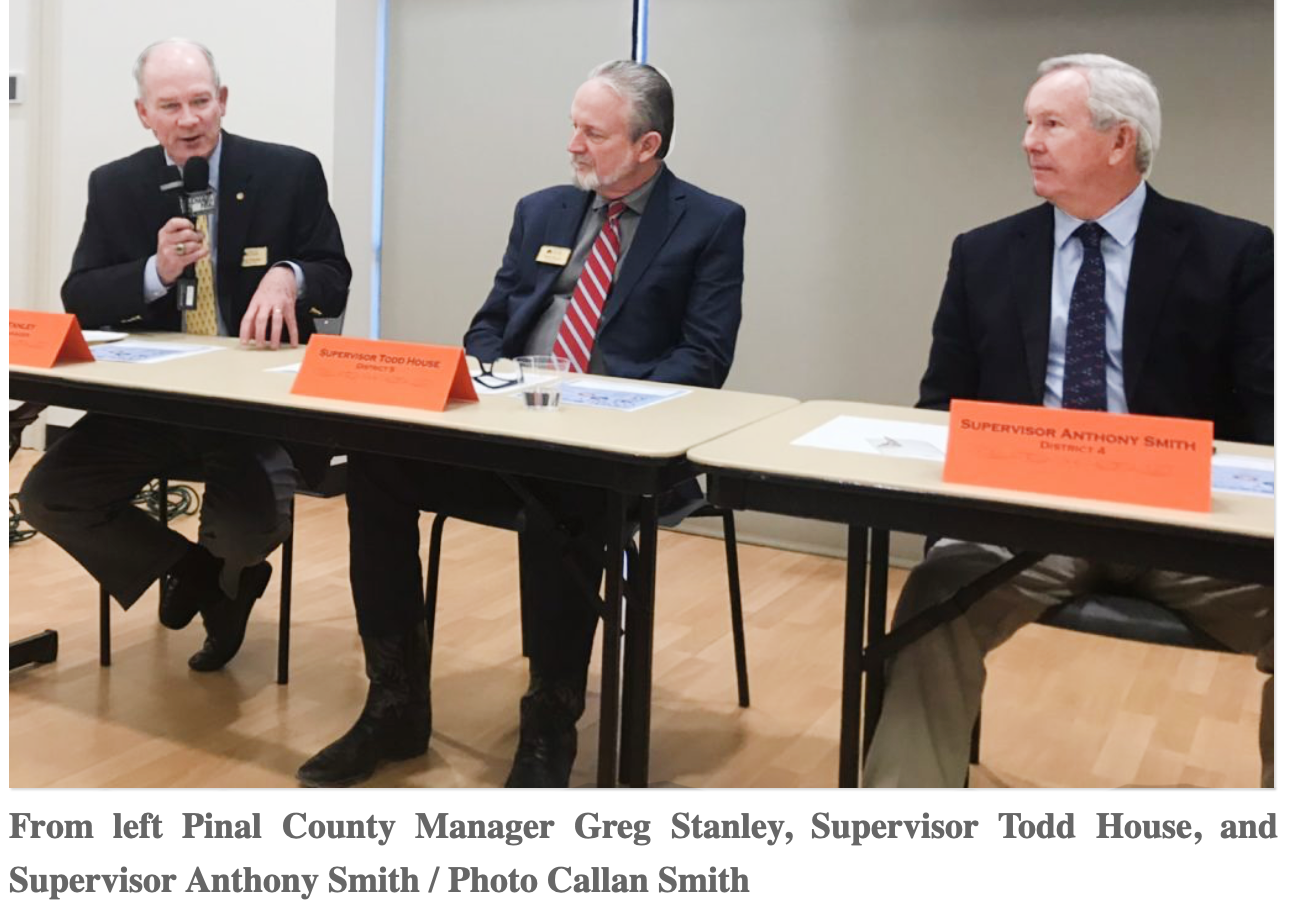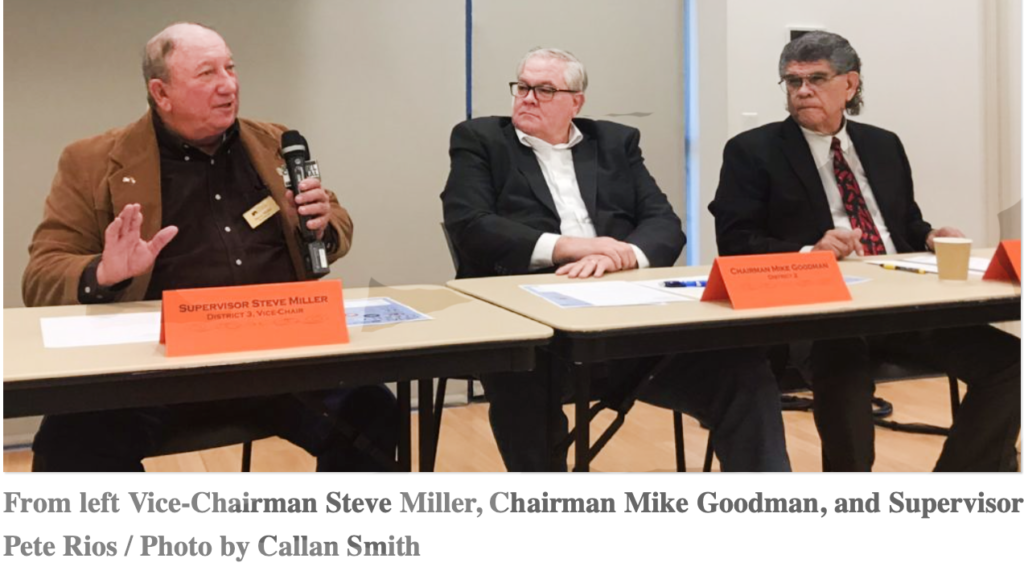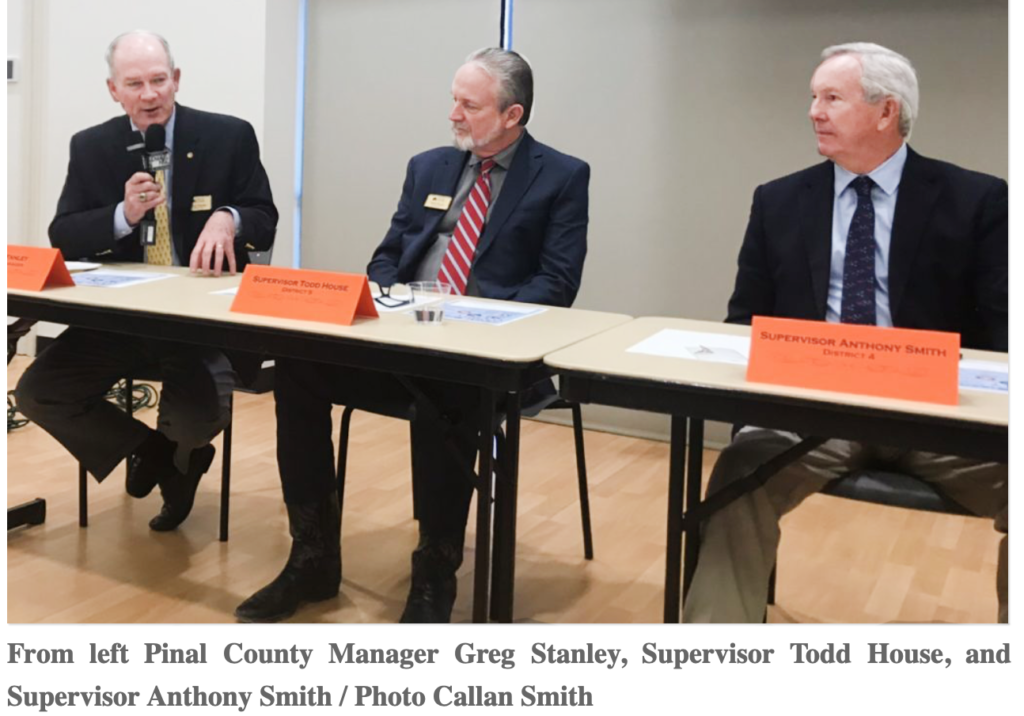By Callan Smith | Rose Law Group Reporter
Last year brought success for the county with corporations the likes of Nikola Motor Company and Lucid Motors signing deals to locate in Coolidge and Casa Grande. This was just one of the topics discussed by the Pinal County Board of Supervisors and the County Manager this morning, as they gathered to speak to a large crowd at a Pinal Partnership event. The discussion was moderated by Jordan Rose, Rose Law Group, founder and president.
The county had 2.3 billion in capital investments made, landing two major projects, which will bring a lot of growth and employment opportunities, newly elected Chairman Mike Goodman, who is the supervisor of District 2, said.
“We should be proud,” District 4 Supervisor Anthony Smith said, and also noted the Apex Motor Club development in Maricopa, which has already broken ground.
“If you’re really looking for an opportunity to start a business, open up a business or expand your business, I think Pinal County is the place to go,” Vice-Chairman Steve Miller, District 3 supervisor, said.
Beyond the Nikola and Lucid win, the county’s transportation plan was noted as a success, despite the appeal on Prop 417, which is the funding mechanism approved by voters in November 2017 for Prop 416, which will address current and future transportation and infrastructure needs in the county.
“One of the biggest successes was the transportation plan; it’s essential to have transportation. None of this is achievable without roads,” District 5 Supervisor, Todd House said.
Pinal County Manager Greg Stanley expanded on the Prop 417 appeal process. The county was served the lawsuit in December of 2017, which was primarily driven by the Goldwater Institute.
Maricopa County Superior Court Judge Christopher Whitten ruled against the county in April of 2018. The judge released the ruling statement in November, which the county appealed in December. No court date has not been scheduled, but the county is still collecting funds from Prop 417, which is close to 10 million dollars.
Other successes included the drop in the tax rate, “even though it was a small amount, we were able to take it in the right direction,” Miller said.
Smith talked about bringing more solar to the county.
“There’s no reason why Pinal County can’t be the solar capital in the United States. I don’t know why this county can’t be considered the greenest county. We have ethanol plant; we have other biotype projects, we have a whole host of large solar projects.”
Why can’t a Republican-led county be the greenest county in the U.S., Smith asked.
Johnson Utilities and the resolution of issues relating to the utility, affecting San Tan Valley was another win for the county said, Miller.
Western Pinal County will be seeing county services soon with a ground-breaking scheduled in October for a new county complex, Smith said.
“We have a great group of elected officials who work well together. They may not agree on everything, but they work well together, and they respect each other and listen to each other. We also have a tremendous collaboration with all our cities and towns. We’re working with Casa Grande and Coolidge with major economic development projects, and we want to work on more,” Stanley said.
The Pinal County Airpark was also lauded as a success. House called it a “diamond in the rough,” stating it would do great things for the county.
Rose asked the supervisors about their goals and challenges for the new year.
District 1 Supervisor, Pete Rios complimented Miller on his efforts in taking the lead on the Drought Contingency Plan.
Miller gave an overview of what was happening with the water situation in the county. He said the latest proposal should go to the legislature this week, or hopefully so.
“It cuts the farmers pool by about sixty or seventy percent, from three-hundred thousand acre-feet to about one-hundred-five for three years then down to seventy for four years, just like any other kind of legislation everyone sees this as an opportunity to get something they want,” Miller said.
The Department of the Interior has directed the state to get a plan done. Miller is worried there will be fighting over the plan, as legislators will want to add to it. A plan needs to pass by the 31st of January, but Miller is confident if the state legislators show they are working on it, the federal government will take note of that and allow the process forward. With the government shutdown in place, it’s an unknown what could happen. One thing that is known, following passage, the plan will go for a federal review.
Even with the potential reduction, Miller is confident that farmers can work with the water they receive and there are funds to drill more wells and add to infrastructure.
Rose asked if the money coming in will get farmers above 105 acre-feet?
“It’s hard to say because they haven’t punched the wells into the ground, so you don’t know what kind of capacity you’ll get,” Miller said.
He doubts the wells will get farmers back to what they have now but expects “they will get them up to where they can be productive.”
He did state the best thing to do is get the plan passed. For Pinal County farmers, there’s no way for them to remain at their current water levels. Both agriculture and Arizona in the long-term will get less water.
The message about water in the county is a problem said Rios, as he related that he recently heard local programming discussion a moratorium on new construction San Tan Valley due to Johnson Utilities.
Rose clarified, stating there is no moratorium on building in San Tan Valley. The news reporting heard by Rios was inaccurate. Building permits are being issued and Epcor, who took over the water utility from Johnson Utilities, has a plan and is already rerouting services.
Rios asked why the state doesn’t have a conservation component with the water policy and raised concerns about pumping groundwater with fissures and dry aquifers. Drilling wells were not something the agricultural community brought to the table, Miller said.
Rose did ask for and receive affirmation from Miller that drilling wells would be an interim solution during this time of drought.
Other challenges raised were continuing workforce development, trades education, continuing to bring in commercial development to offset tax dollars leaving the county, and the need for hospitality services in District 1, which is a draw for eco-tourism.














